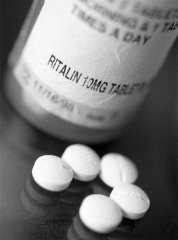Ritalin Addiction
Overview, Signs, Symptoms & Treatment

Ritalin abuse can lead to addiction, a chronic and relapsing condition where a person struggles to control their drug use.
Methylphenidate, or its brand name Ritalin, is a stimulant ADHD medication that is prescribed to adults and children who have difficulty concentrating, staying still, and controlling their actions for the same amount of time as other individuals their age. According to the NLM, Ritalin “is also used to treat narcolepsy (a sleep disorder that causes excessive daytime sleepiness and sudden attacks of sleep).” Ritalin can be a very helpful medication, but unfortunately, it is also habit-forming.
Those who abuse Ritalin for the euphoric effects it can cause in high doses (or for the purposes of academic performance or weight loss) can become addicted to the drug. Ritalin addiction can be easily determined if you know the signs and symptoms for which to look, and treatment will be necessary for the addicted individual.
Ritalin Addiction Overview
According to the NCBI, “It is estimated that 4.1 million people 12 and older in the United States in 2003 had used methylphenidate [Ritalin] without a physician’s prescription at least once in their lifetime.” This is drug abuse, as Ritalin is a prescription drug and is not meant to be taken in higher doses or more frequent doses than prescribed or without the prescription of a doctor. While there are many individuals who abuse Ritalin for different effects, addiction to Ritalin occurs after continued abuse of the drug.
Ritalin abusers who take high doses of Ritalin and/or take it chronically are especially in danger of becoming addicted to the drug. College students are also especially susceptible, as the abuse of Ritalin and other stimulant drugs is more likely to happen to full-time college students (SAMHSA states “twice as likely” in the case of Adderall). Ritalin addiction still occurs, especially in these situations, and should be treated in formal drug rehab in order for the individual to recover.
Ritalin Addiction Signs
How do I know my loved one is addicted to Ritalin? There are many signs that can help you discover whether or not someone you know is addicted to Ritalin. According to the DOJ, some of the common risks associated with long-term Ritalin abuse and addiction are:
- Psychotic episodes
- Hallucinations, agitation, paranoia, and anxiety can all occur if a person is abusing Ritalin chronically. This can sometimes lead to stimulant-induced psychosis which is a condition similar to schizophrenia that is caused by an overuse of stimulant drugs.
- Cardiovascular problems
- When someone who is abusing Ritalin experiences a pounding heartbeat, chest pain, or shortness of breath, there is a strong likelihood that they are abusing the drug to the point of causing heart failure or stroke. If a person continues to abuse Ritalin after an issue such as this one, they are definitely addicted.
- Binge abuse
- A person who becomes addicted to Ritalin is likely abusing the drug in binge-crash patterns, taking large doses of the drug for several days and then crashing at the end and sleeping off the withdrawal symptoms. A binge-crash pattern of abuse can be especially dangerous.
Other signs of Ritalin addiction may include:
- Secretive behavior
- Mania
- Seizures (especially when the individual has had no history of seizures)
- Withdrawal symptoms
- Depression
- Sleep problems
- Fatigue
- High blood pressure
- Extreme weight loss and malnutrition
- Anxiety
- Injection of Ritalin may cause
- “Lesions at the injection site” (CESAR)
- An increased risk of HIV or hepatitis from needle sharing
Ritalin Addiction Symptoms
The symptoms of Ritalin addiction will be obvious to the individual abusing the drug. If you abuse Ritalin chronically and are worried that you may be addicted, ask yourself the questions below to find out.
- Do I take Ritalin every day even though I am not prescribed to?
- Do I feel like I need Ritalin in order to do well in school, have fun, or for any reason that causes me to feel unable to stop?
- Do I ever make excuses to use Ritalin?
- Have I suddenly started spending time only with others who abuse Ritalin?
- Have I noticed that I am more hostile, paranoid, aggressive, or anxious than I was before I started taking Ritalin?
- Has my Ritalin use caused major problems in my life including but not limited to financial, legal, professional, education-based, or personal?
- Do I experience psychological and physical symptoms when I stop abusing the drug or am not able to take it, such as strong cravings, depression, fatigue, etc.?
- Have I noticed that I do not feel the same high I once did from Ritalin and now need to take more of the drug in order to feel the effects I want?
- Despite these problems, do I still continue to abuse Ritalin?
- Do I feel that I would be unable to stop abusing Ritalin, even if I really wanted to?
If you feel these issues describe you, it is very likely that you are already addicted to Ritalin. Those who abuse Ritalin chronically will often become addicted without realizing it. Their grades in school will suffer, they will begin acting strangely, and they will need treatment to be able to stop abusing the drug.